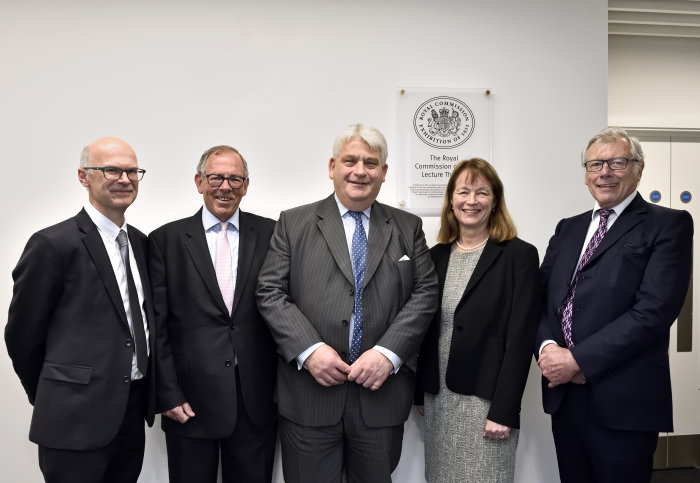Dyson School celebrates support from Royal Commission for the Exhibition of 1851
by Mia Roberts

Commissioners from the Royal Commission for the Exhibition of 1851 were welcomed to Campus to celebrate their support of Design Engineering.
Imperial College London has formally recognised the Royal Commission for the Exhibition of 1851 for their contribution to the College’s Dyson School of Design Engineering.
The Commission, a longstanding supporter of the College, gifted £200,000 to fund new teaching spaces and a lecture theatre within the new Dyson Building at the College’s South Kensington Campus.
Founded in July 2014, the Dyson School of Design Engineering is Imperial’s newest engineering department and until now, has not had a permanent home.
Its teaching and research fuses design thinking with engineering within a culture of innovation and enterprise, and is supporting a growing number of students and staff. The new Dyson Building, a former Post Office on Exhibition Road, will create new, larger premises for the school, housing state-of-the art teaching and collaborative spaces and laboratories.
Commissioners were invited for a tour of the new Dyson Building, which will officially open in May 2019, and had the opportunity to meet with staff and students benefiting from the new facilities.
Professor Alice Gast, President of Imperial, Professor Nigel Brandon, Dean of Engineering, and Professor Peter Childs, Head of the Dyson School, unveiled a commemorative plaque outside the newly named ‘Royal Commission for the Exhibition of 1851 Lecture Theatre’ in recognition of the generous support.
Following the tour, Professor Childs thanked the Commission not only for the lecture theatre, but for ongoing support for the School as a whole, including the opportunities it provides for students through the Industrial Design Studentship scheme.
Professor Childs said: “When we first pitched ideas for the Dyson School, we had a vision for a new paradigm for design engineering: the fusion of design and engineering thinking with a culture of innovation and enterprise. Today, we have a fully formed School with over 430 students and 40 staff, a main building, workshop, lecture theatre and laboratories.
"The College is very appreciative of the Commission’s support for the use of the ‘Old Post Office Building’ for educational purposes, and we are delighted to recognise their contribution towards the refurbishment of the building. This gift was crucial in supporting the School shortly after its inception and we are extremely pleased to be continuing Imperial’s historic relationship with The Royal Commission for the Exhibition of 1851.”
President Gast also expressed her gratitude to the Commission and relayed stories from students who had shared how proud they were to be a part of the School and studying in the new building.
Chairman of the Commission, Bernard Taylor CBE, said that he was pleased the Commission was able to continue supporting the College and the advancement of science and engineering within ‘Albertopolis’.
"This gift was crucial in supporting the School shortly after its inception and we are extremely pleased to be continuing Imperial’s historic relationship with The Royal Commission for the Exhibition of 1851." Professor Peter Childs Head of the School of Design Engineering
The Royal Commission for the Exhibition of 1851 shares a long history with Imperial, and with South Kensington as a whole. The Commission was established in 1850 by Her Majesty Queen Victoria to organise the first world trade fair: the Exhibition of the Works of Industry of All Nations. Following the Exhibition, the Commission invested the profits, initially by purchasing 87 acres of land stretching from Kensington Gore to Cromwell Road.
Driven by Prince Albert’s mission to “increase the means of industrial education and extend the influence of science and art upon productive industry”, they aided the establishment of the Victoria and Albert Museum, Science Museum, Natural History Museum, the Royal Albert Hall, Royal College of Art, Royal College of Music and Imperial College London.
Today, the Commission awards fellowships and scholarships for advanced study and research in science, engineering, the built environment and design, and gives its support to initiatives that raise awareness of the opportunities presented by science and engineering.
Article text (excluding photos or graphics) © Imperial College London.
Photos and graphics subject to third party copyright used with permission or © Imperial College London.
Reporter
Mia Roberts
Advancement